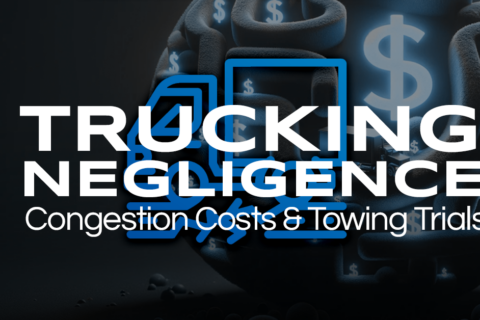Revitalizing Logistics: Axle’s Expansion, Lineage’s IPO, Fr8Labs’ Tech Leap & More Industry Shifts
The ever-evolving world of logistics and transportation is on the cusp of some exciting transformations, driven by innovative strategies and technological advancements. In this article, we delve into the latest developments shaping the industry’s future. From Axle Logistics’ ambitious expansion in Knoxville, boosting job opportunities and regional economic growth, to Lineage Logistics’ planned IPO, set to redefine the cold storage logistics landscape, and Fr8Labs’ revolutionary approach to modernizing Asia’s freight forwarding market, these stories highlight pivotal shifts in the logistics sector. Each narrative offers a glimpse into how companies are adapting and thriving amidst changing economic and technological landscapes, setting new benchmarks in efficiency, expansion, and innovation. Significant Job Growth Through Axle Logistics Expansion Axle Logistics, LLC, a prominent third-party logistics company based in Knoxville, Tennessee, has announced a significant expansion of its operations. With a substantial investment of $37.9 million, the company plans to nearly triple its workforce in Knox County by adding 651 new jobs over the next five years. This expansion involves the construction of an 85,000-square-foot facility adjacent to its current headquarters on North Central Street. The move is a response to Axle Logistics’ steady growth since its inception in 2012 and will enable the company to enhance its services across the U.S., Canada, and Mexico. Axle Logistics, established in Knoxville with a satellite office in Chattanooga, has become a key player in the transportation sector. Knoxville’s Economic Development and Axle Logistics’ Commitment The expansion of Axle Logistics aligns with the broader economic growth in Knox County, where the Tennessee Department of Economic and Community Development (TNECD) has facilitated nearly 20 development projects since 2019, creating approximately 1,800 job commitments and $125 million in capital investment. This initiative has garnered support from state and local government officials. Governor Bill Lee and TNECD Commissioner Stuart C. McWhorter have lauded the expansion, emphasizing its contribution to creating more opportunities for Tennesseans and boosting the Knoxville area’s economy. Axle Logistics’ commitment to job creation and regional development is also acknowledged by local officials, including Knoxville Mayor Indya Kincannon and Knox County Mayor Glenn Jacobs, who praise the company for revitalizing the area and retaining local talent. The expansion, which reflects Tennessee’s pro-business environment and skilled workforce, is celebrated by state representatives and corporate partners like TVA and Knoxville Utilities Board. 🔗 Read the full article on Axle Logistics’ expansion in Knox County here Lineage Logistics Eyes Major IPO in Cold Storage Sector Lineage Logistics, a leading provider of temperature-controlled storage and logistics, is reportedly preparing for a substantial initial public offering (IPO) valued at over $30 billion for next year. This move positions Lineage, headquartered in Novi, Michigan, as a significant player in the global cold storage sector. Since its inception in 2008, backed by the private equity firm Bay Grove, Lineage has expanded its reach impressively. It now boasts a portfolio of more than 400 facilities with 2.5 billion cubic feet of space across North America, Europe, and the Asia-Pacific. The company’s comprehensive logistics services include freight forwarding, customs brokerage, drayage, and truck transportation, offering end-to-end solutions from its warehouses. Lineage’s Growth and Strategic Financial Moves Lineage’s journey to its current stature involved substantial financial backing, with more than $13 billion raised to date, as per PitchBook data. Notably, in the last year alone, two funding rounds brought in over $2.4 billion. Since early 2020, Lineage has raised $6.7 billion in equity alongside smaller debt issuances. Bloomberg reports that Lineage has enlisted Morgan Stanley (NYSE: MS) and Goldman Sachs (NYSE: GS) as lead underwriters for its IPO. This forthcoming IPO positions Lineage significantly ahead of its closest public competitor, Americold Realty Trust (NYSE: COLD), which currently has a market cap of $8 billion. While Lineage hasn’t officially commented on these developments, its ambitious IPO plan underlines the company’s commitment to expanding its global footprint in the cold storage logistics sector. 🔗 Read the full article on Lineage Logistics’ reported IPO here Revolutionizing Asia’s Freight Forwarding Market with Fr8Labs Fr8Labs, aspiring to become the “Shopify of logistics,” is transforming Asia’s freight forwarding market, primarily dominated by small and medium-sized businesses using outdated processes. The Singapore and Indonesia-based company has developed a cloud-based operating system specifically for freight forwarders, designed to streamline and integrate various stages of the shipping process. This innovative approach reduces redundancies, missed opportunities, and unnecessary expenses like demurrage penalties for SMB clients. Fr8Labs’ system enhances efficiency by automating shipment booking and other workflows from simple PDF uploads, significantly reducing human error and potential customs-related delays. Their groundbreaking use of genAI applications, including an AI assistant bot, positions them as a market leader in tech-driven logistics solutions. Fr8Labs’ Business Model and Growth Aspirations With a successful seed funding round of US$1.5 million, backed by investors like East Ventures, FEBE Ventures, and Venturra, Fr8Labs operates on a user-friendly subscription model. This model allows clients to customize their experience with additional modular options, aligning with the varying needs of freight forwarders. The company plans to broaden its offerings to include warehouse management, forex trade, and financing solutions. Currently, Fr8Labs has established a significant customer base across Singapore, Indonesia, Malaysia, Taiwan, and Australia. CEO Glenn Lai envisions Fr8Labs as the primary system for all freight forwarders in the ASEAN region and plans to expand further into Asia within the next five years, marking a significant leap in the modernization of the freight forwarding industry in the region. 🔗 Discover more about Fr8Labs’ innovative approach to freight forwarding here Before You Hit The Road… As we conclude this insightful journey through the latest milestones in the logistics and transportation industry, it’s clear that the sector is embracing change with open arms. Axle Logistics’ massive expansion in Knoxville is not only a testament to its own growth but also reflects the broader economic development in the region. Lineage Logistics’ impending IPO signals a major leap forward in the cold storage sector, potentially catalyzing a new era of logistics solutions. Meanwhile, Fr8Labs is pioneering a digital revolution in Asia’s freight forwarding market,…











Recent Comments